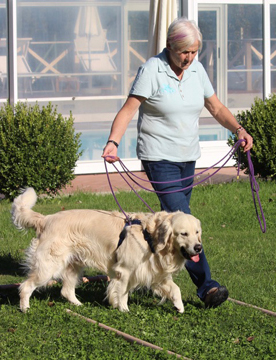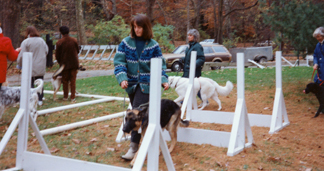About Workshops for Dogs and other Companion Animals
 A variety of instructors, each with a well-rounded education in the Tellington TTouch® Method as well as other modalities, trade off teaching clinics in different parts of the world. Each clinic is well-staffed with knowledgeable assistants who are always there to answer questions, help with concerns or lend a hand with more challenging animals. Our organization works closely with a number of private shelters, the SPCA and animal humane societies. During most of the clinics participants have the opportunity to visit a shelter and learn to observe and work with dogs, cats, rabbits or any other animals that might be available.
A variety of instructors, each with a well-rounded education in the Tellington TTouch® Method as well as other modalities, trade off teaching clinics in different parts of the world. Each clinic is well-staffed with knowledgeable assistants who are always there to answer questions, help with concerns or lend a hand with more challenging animals. Our organization works closely with a number of private shelters, the SPCA and animal humane societies. During most of the clinics participants have the opportunity to visit a shelter and learn to observe and work with dogs, cats, rabbits or any other animals that might be available.
In each of these trainings, attendees will include students from all levels of the program. For more than twenty years, we have found that this combination has provided a rich exchange of ideas and experiences to all participants. Participants attend with or without their animals, the choice is up to you. Every one of our trainings is a little different. The dogs and other animals, brought by the participants, add a unique flavor to each week. No matter how many clinics you attend, you always walk away with some new insight in animal behavior and new tools to help solve common as well as not so common issues. Participants come from diverse experiences, backgrounds, and interests that enrich the entire group and the learning experience as a whole. Tellington TTouch Trainings provide a safe and relaxed learning atmosphere where sharing information and ideas is encouraged.
Our philosophy is very complementary to all forms of positive training. We believe that physical, mental, and emotional balance is interconnected. Helping dogs achieve self-carriage (physical balance), leads to an increase in self-confidence (mental balance), which allows them to make better choices (emotional balance). For this reason the Tellington Method goes beyond “training” and actually helps the animals learn to act rather than simply react.
Dogs represent the majority of animals at most clinics, and you will learn to see their posture, body language, calming signals, gait and behavior with new eyes. The same assessments are applied to other animals with minor variations. Observation and evaluation are followed by a hands-on exploration of the animal’s body (if the animal is ready to be touched safely) to find areas of tension, soreness or change in the body. During the sessions, the clinic participants get the opportunity to TTouch many different dogs and other animals while honing their observation skills and using out techniques to help the animals overcome issues, physical and emotional.
The ground and leading exercises get everybody moving and teach the dogs and handlers to move in balance with the help of a variety of harnesses and canine halters. Our Playground of Higher Learning teaches dogs to slowly negotiate a series of obstacles and use their bodies in a new way. Suddenly incorrigible leash-pullers are walking carefully over a series of boards on a loose leash and dog-aggressive canines are passing each other in the labyrinth without concern. Dogs that were glued to their owners the first day of the training are happy to go for a walk with a stranger.
Clinic participants enjoy the light hearted, positive learning environment and lifelong friendships are often formed. They share fun and laughter, practice the TTouches and leading exercises on each other in a supportive environment.
Participants who are striving to become practitioners have the opportunity to work with clients and their animals in a supportive environment. Other sessions include marketing, client relationship and setting up an animal business. It is impossible to walk away from a Tellington TTouch Training without a new understanding and appreciation for the animals in our lives.
Events are offered throughout the year by several different instructors. If you are interested in organizing an event in your area please contact us. Organizing is straightforward and is a great way to connect with like-minded animal lovers in your area.
You can choose:
Hands-on Workshops
Series of Hands-on Workshops for Groups – one session per week, afternoon or evening, for 6-8 weeks.
Five- or six-day trainings serve as a Foundation Training to learn the basics of the Tellington Method and also are part of the continuing six-session Practitioner Certification Program.
Testimonials
Replying to the question What are the most important things you learned from the workshop?, one participant said: “TTouch® teaches love, understanding and respect”.
Douglas A. Miller, a trainer from the Los Angeles area, brought a dog-aggressive Border collie. Douglas was just curious about the Telllington Method and said he had not really expected a big change. By the end of the two days, his dog was completely comfortable and non-aggressive with the 15 dogs in the seminar. He wrote: “TTouch offers a non-violent, humane approach to working with and training animals. It has changed my life and the life of all animals I will ever work with!”
Christine DiGuesto stated: “The most important thing I learned is that there are individual personalities, behaviors, and needs in our companion animals just as among ourselves, and that respect and understanding of these differences is important. I feel that the work we can do with TTouch® for our companion animals can teach us how to better relate to our fellow human beings. In a few hours of working with Linda, I have truly become more aware of the power of this kind of communication. TTouch can make the world a better place for all.”
Christine rides endurance and has used the TTouch for several years to calm and focus her horse. In the training, she worked with a dog from the Pasadena Humane Society who was considered unadoptable. Christine wrote on her evaluation form: “This weekend I brought a very mouthy shelter dog to the workshop. The change has been incredible. He went from being a hyperactive blur that chewed on everyone and everything to a balanced, thinking creature.”
Another participant wrote, “My two female shepherd-mixes used to fight for dominance at home and wound up at the vet office twice needing stitches. The younger female (challenger) is now noticeably calmer and has regained respect for her older companion. The older female currently is being worked on to regain her old self-confidence.”
Evan Ozahawk, a volunteer at the Pasadena Humane Society for several years, wrote, “I thought claims and previous comments were clearly exaggerated. I can say after two days that all was true. I was truly amazed at the results on which I thought were hopeless cases.”
Georgiann Schneider has been trainer for a decade and a half and specializes in Rottweilers. On her evaluation form she wrote:
“I have had my female Rottweiler for one month. I have had many Rotties over the years but this new one was very hyperactive. I have always used a lot of touching to develop a bond with new dogs. This new female was so stimulated by me being near her that I could not get her to hold still to be petted. She’d jump all over me in her excitement and never settled down, so after 10 minutes I would have to confine her to her crate or kennel.
“On the second morning of the seminar, my ‘hyperactive’ dog entered the seminar room, looked around for 10 minutes and then lay quietly at my feet (awake – not asleep!) for the next 50 minutes. I would have been satisfied if she would have held still for 10 minutes, but for her to be able to lay quietly in a room full of dogs (not always quiet) is truly unbelievable. If I hadn’t been there in person, I wouldn’t have believed it!”


